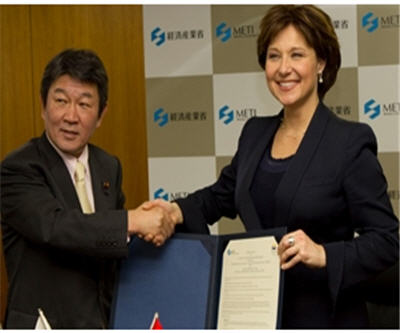Canadians losing enthusiasm for building closer ties with Asia

Canadians are losing interest in strengthening social and economic ties with Asian countries, concludes the Asia Pacific Foundation’s (APF) annual National Opinion Poll: Canadian Views on Asia published June 10.
In 2013, 50% of those surveyed across the country said they felt Asian investment would benefit Canada. In 2014, that number dropped to 41%. China saw the biggest drop, from 45% in 2013 to 35% in 2014, which the APF said is the lowest level since the poll was developed 10 years ago.
The survey found that 37% of Canadians feel that political and economic relations with Asia should be our top foreign policy priority. This is down 14 percentage points from 51% in 2013.
Of all the Canadian provinces, British Columbia has the most positive feelings toward Asia, and Ontario has the most negative. British Columbians are the most likely to consider Canada to be part of the Asia Pacific region (44% compared with 22% nationally.
The drop in support for working with Asia will translate into policies that don’t support strengthening Canada’s ties with the region. More Canadians oppose providing economic incentives to Canadian companies to establish operations in Asia, and fewer support trade missions to Asia.
This drop in enthusiasm will probably have negative consequences, the APF said.
“Canadian hesitation to engage with Asia is likely to be costly,” said the report, which said relations between Canada and Asia will stagnate unless the negative sentiments can be addressed. “We risk losing opportunities for economic growth and diversification. Over time, this could translate into Canada losing global clout and the ability to effect change in Asia.
“Even as Canadians express a preference for remaining tied to traditional economic partners, those very partners are aggressively building stronger political and business ties with Asian countries.”
The APF said Canadians are more comfortable dealing with foreign countries with which they feel “politically like-minded.” For example, those who expressed concern over human rights and democracy said they are less comfortable dealing with countries such as China, India and South Korea. As well, those respondents who believe that security
In order to address these issues, said the report, Canadians must be given more information about developments in Asian countries.
“Where concerns about security and political rights are likely to continue to play a role in shaping opinions, the public will need reassurance that economic engagement will not come at the cost of compromising Canadian values and national interests,” said the report.
The APF said political leaders, businesses and educational institutions should all work toward increasing familiarity with Asia and forging stronger ties.
“Greater comfort with Asia will not happen by accident,” said the report. “We have to start with a conscious effort to forge a national consensus on the importance of Asia for our country.”

{{ commodity.name }}
{{ post.title }}
{{ post.date }}




Comments
Judy
Perhaps the ‘deal’, Mr. Harper attempted to make with China, has had an effect on the changing percentages.